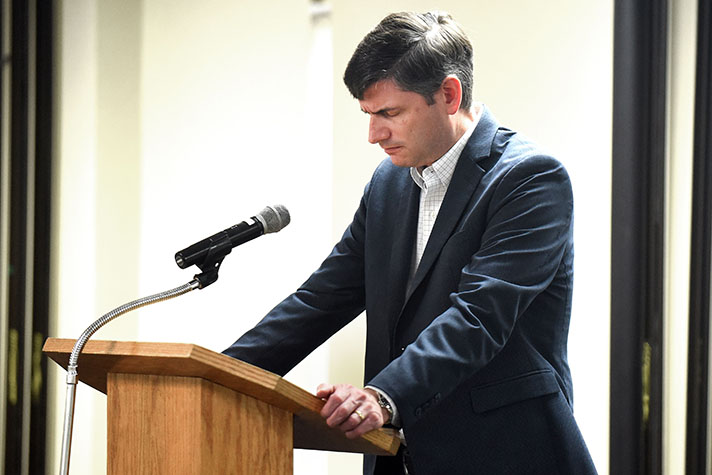
Bible Reading: 2 Samuel 24:18-25, NKJV
Many years ago, when I was a pastor of a church plant in North Carolina, we undertook a capital fundraising campaign. It’s safe to say that very few people really enjoy raising money, or asking people to give of their resources. While it’s necessary to do, it can be awkward and uncomfortable.
However, as a growing church, we prayerfully knew that we needed to ask our congregation to sacrifice and give for the sake of the Kingdom in our community.
As we began this process, I asked the congregation to first prepare themselves by praying, fasting, and reading and meditating on the Word of God. I then shared with them a message from 2 Samuel 24:18-25 as we considered what it means to sacrifice our resources for God.
>>Looking for weekly devotions like this one? Sign up to get Will Graham’s Wednesday in the Word delivered to your inbox.
In the preceding verses, David had sinned against God by performing a census of the people. In the end, 70,000 people died because of David’s error. (Read more about this event in the devotional from 1 Chronicles 21.)
Afterwards, God directed David to go to the threshing floor of Araunah (called Ornan, a variation of the same name, in 1 Chronicles) and offer a sacrifice unto the Lord. When Araunah saw David coming, he fell before him and offered to give King David everything needed for the sacrifice: the land, the animals, and even his oxen’s wooden yoke for the fire.
But David refused and said, “No, but I will surely buy it from you for a price; nor will I offer burnt offerings to the Lord my God with that which costs me nothing” (v. 24).
We can learn several lessons concerning sacrifice from this passage.
First, obedience is the foundation for sacrificing. Obedience is what God desires the most from us. David’s sin, on the other hand, brought God’s judgment. Do not be fooled into thinking that giving will erase rebellion. Amos 5:22 clearly states that God will not accept sacrifice if is not done in obedience.
Second, when we sacrifice, we need to fix our eyes on God, our reason for giving. David’s problems started when he took his eyes off the Lord and looked to himself. This pride led him to count the people (i.e. his strength).
Araunah, however, is an example of humility. He saw David, recognized him, and bowed in submission, offering a gift of great worth. When we sacrifice, we need to focus on Jesus, never on ourselves.
Third, sacrifice is for everyone. Araunah, the humble farmer, was willing to give everything to David: the land, the oxen, and the wood from his hand-carved yokes. On the other end of the spectrum, King David purchased the threshing floor—and later on, the whole mountaintop—as a place to sacrifice unto the Lord. From the king to the farmer, both were willing to sacrifice.
Finally, true sacrifice will cost you something. Araunah’s sacrificial offer was no small gift. It would have been very costly to him, but he offered it freely to the king. And David realized that if it did not cost him something, it would not be worship. That is why he refused the gift and paid Araunah instead.
A sacrifice that costs nothing is worth nothing.
It’s interesting to note that this land would later become the site of Solomon’s Temple (2 Chronicles 3:1). Though David did not build nor see the Temple, he acquired the land on which the next generation would build. This is an important truth for us to remember. When we sacrifice for the Kingdom of God, we are laying a foundation for the next generation to continue to worship and grow in the faith, while also imparting to them the importance of the principle of sacrifice.
My friends, I encourage you to look for areas to sacrifice of your time and resources for the glory of God. The things of this world are temporary, but true sacrifice is eternal. May we honor the Lord and serve Christ, while leaving a godly legacy of obedience to the next generation.
Scripture Reference: 2 Samuel 24:18-25
18 And Gad came that day to David and said to him, “Go up, erect an altar to the Lord on the threshing floor of Araunah the Jebusite.”
19 So David, according to the word of Gad, went up as the Lord commanded.
20 Now Araunah looked, and saw the king and his servants coming toward him. So Araunah went out and bowed before the king with his face to the ground.
21 Then Araunah said, “Why has my lord the king come to his servant?”
And David said, “To buy the threshing floor from you, to build an altar to the Lord, that the plague may be withdrawn from the people.”
22 Now Araunah said to David, “Let my lord the king take and offer up whatever seems good to him. Look, here are oxen for burnt sacrifice, and threshing implements and the yokes of the oxen for wood.
23 All these, O king, Araunah has given to the king.”
And Araunah said to the king, “May the Lord your God accept you.”
24 Then the king said to Araunah, “No, but I will surely buy it from you for a price; nor will I offer burnt offerings to the Lord my God with that which costs me nothing.” So David bought the threshing floor and the oxen for fifty shekels of silver.
25 And David built there an altar to the Lord, and offered burnt offerings and peace offerings. So the Lord heeded the prayers for the land, and the plague was withdrawn from Israel.

